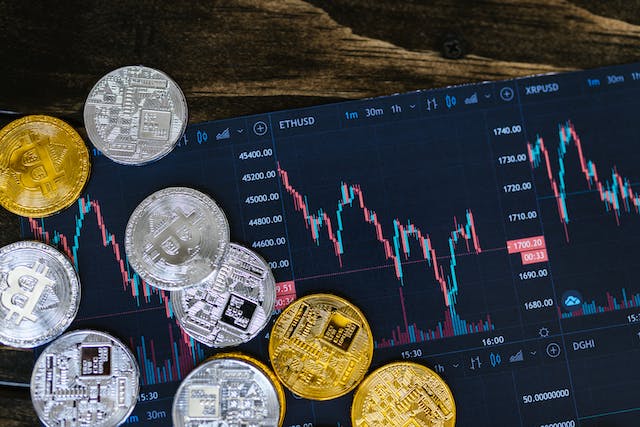Introduction
In the ever-evolving landscape of finance, cryptocurrencies have emerged as a disruptive force, challenging traditional notions of store-of-value assets. With the rise of Bitcoin and other digital currencies, the question on many minds is whether crypto will eventually replace gold as the ultimate store of value.

As the world moves toward a more digital era, the debate intensifies. Amidst the ongoing conversation, platforms continue to empower investors to participate in this intriguing financial revolution. To ensure safety while investing in crypto like Bitcoin, you may visit the Official website of the most recommended trading platform online.
The Emergence of Cryptocurrencies
Over the past decade, cryptocurrencies have garnered significant attention and adoption. Bitcoin, the pioneering cryptocurrency, was introduced in 2009, and its decentralized nature and limited supply have drawn comparisons to gold, a traditional store of value asset for centuries. As cryptocurrencies gained momentum, a new breed of investors began to see them as a potential alternative to gold. The entry of platforms provided people with user-friendly tools to access the crypto market, further fueling its growth.
The Gold Standard: A Timeless Store of Value
Throughout history, gold has been revered as a store of value, a safe-haven asset, and a hedge against inflation and economic uncertainties. Its unique physical properties and limited supply make it highly sought after, especially during times of financial instability. For generations, investors have turned to gold to preserve their wealth and diversify their portfolios. However, with the advent of digital currencies, the traditional notion of the gold standard is being challenged.
The Advantages of Cryptocurrencies
Cryptocurrencies offer several advantages over gold. First and foremost, they are highly divisible, allowing for microtransactions, which would be impractical with physical gold. Additionally, the blockchain technology that underpins cryptocurrencies ensures transparency, security, and immutability of transactions, making them more resilient to fraud and counterfeiting. Moreover, cryptocurrencies are borderless, enabling seamless cross-border transactions without the need for intermediaries. These features make digital currencies like Bitcoin, Ethereum, and others attractive to tech-savvy investors and those seeking financial inclusion.
The Inherent Challenges of Cryptocurrencies
While cryptocurrencies have their advantages, they also face several challenges that need to be addressed before they can replace gold as a store of value. One of the most significant concerns is their price volatility, with wild price swings often seen in the crypto market. This volatility has deterred risk-averse investors from fully embracing cryptocurrencies. Additionally, the regulatory environment surrounding digital currencies remains uncertain in many parts of the world, causing further hesitancy among traditional investors.
Gold’s Time-Tested Stability
Gold’s enduring stability over centuries has instilled confidence in investors, especially during times of economic downturns. It’s physical nature and limited supply provide a tangible reassurance that digital assets are yet to match. Gold has also maintained its value in various economic and geopolitical scenarios, making it a reliable hedge against inflation and currency devaluation. However, the emerging technology and growing interest in cryptocurrencies may reshape the perception of stability in the future.
The Role of Institutional Investors
The involvement of institutional investors has been a crucial factor in the evolution of cryptocurrencies as a store of value. As institutions increasingly show interest and invest in digital assets, their legitimacy and acceptance rise significantly. Major financial institutions and corporations have started to add cryptocurrencies to their investment portfolios, further blurring the lines between traditional assets and digital currencies.
The Path Forward: Complementary Assets
While the debate on whether cryptocurrencies will replace gold continues, it is essential to consider that both assets can coexist and complement each other within an investor’s portfolio. Each offers unique advantages, and depending on individual investment goals and risk tolerance, a balanced approach incorporating both traditional assets and digital currencies may be prudent.
The Evolution Continues
The future of crypto as a store of value remains uncertain, but one thing is certain: the financial landscape will continue to evolve. Technology will play a pivotal role in shaping the financial instruments of tomorrow, and cryptocurrencies are at the forefront of this transformation. As platforms continue to provide accessible avenues for investors to participate in the crypto market, the adoption of digital currencies may only accelerate.
Conclusion
The question of whether cryptocurrencies will replace gold as the ultimate store of value is a complex one, hinging on factors like technological advancements, regulatory clarity, and investor sentiment. While gold’s historical significance and stability are undeniable, cryptocurrencies offer a compelling alternative with their unique advantages. As the world embraces digitization, both assets may find their place in diversified portfolios. Only time will tell whether digital currencies will fully replace gold or if they will work side by side, each serving different purposes for investors seeking to secure their financial futures. Until then, platforms continue to empower individuals to explore the exciting world of cryptocurrencies and be part of this ongoing financial revolution.